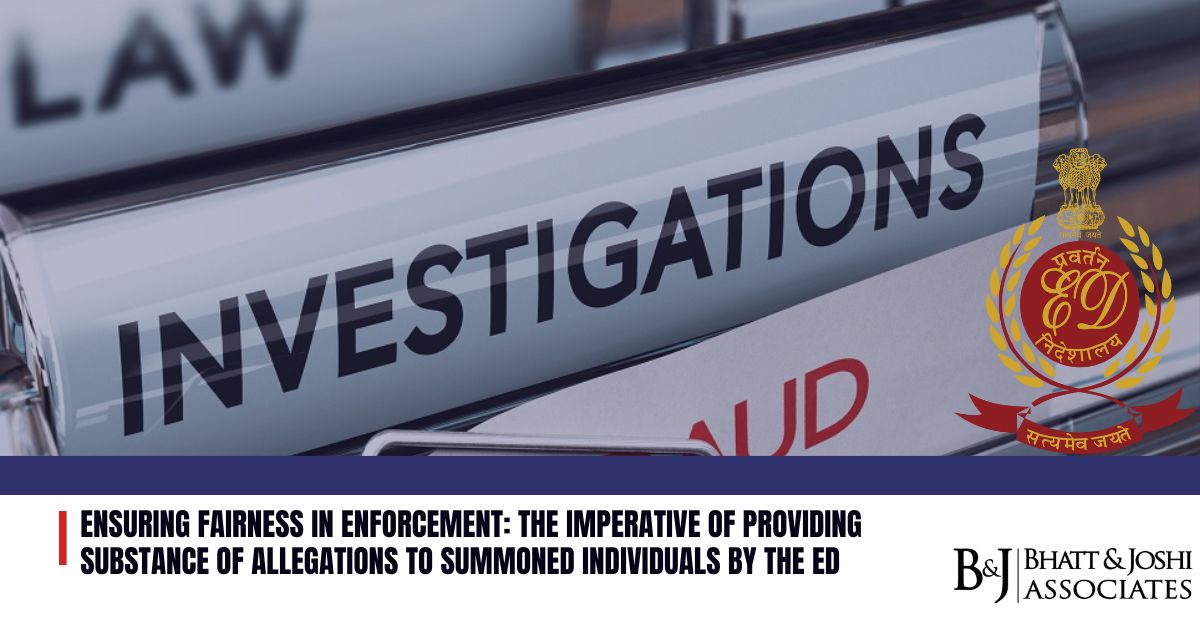Fairness in Enforcement: Upholding Substance of Allegations to Summoned Individuals by the ED

Introduction
In recent years, the Enforcement Directorate (ED) has played a crucial role in investigating and prosecuting cases related to financial crimes and money laundering in India. Under the Prevention of Money Laundering Act (PMLA), the ED has been empowered to summon individuals for inquiries and investigations. However, questions have arisen regarding the fairness of these investigations, particularly concerning the information provided to summoned individuals. The recent judgment by the Lucknow Bench of the Allahabad High Court in the case of Saurabh Mukund vs. Directorate of Enforcement has brought significant attention to this issue. The court emphasized the importance of the ED providing either a copy of the Enforcement Case Information Report (ECIR) or informing summoned individuals about the substance of the allegations against them. This ruling has far-reaching implications for the conduct of investigations by the ED and the rights of individuals involved in ensuring fairness in enforcement.
Background and Context
To understand the significance of the court’s ruling, it is essential to delve into the background and context of the case. Saurabh Mukund, the petitioner in this case, received summonses related to ECIRs requiring him to provide details about 111 companies. These summonses were based on recommendations from the Serious Fraud Investigation Office (SFIO). However, Mukund objected to the summonses, arguing that he was not provided with adequate information about the allegations against him.
The Court’s Analysis: Ensuring Fairness in Enforcement
The Single Judge Bench, comprising Hon’ble Mr. Justice Mohd Faiz Alam Khan, carefully analyzed the arguments presented by both parties. While acknowledging the Supreme Court’s ruling that furnishing a copy of the ECIR is not mandatory, the court emphasized the need for fairness in investigations. Justice Khan highlighted that individuals summoned by the ED should, at the very least, be informed about the substance of the accusations against them. This would enable them to prepare themselves adequately and respond effectively to the ED’s inquiries during interrogation.
Key Legal Principles: Upholding Fairness and Transparency in Enforcement Processes
The court’s ruling in this case is based on several key legal principles. Firstly, it reaffirms the importance of fairness and transparency in law enforcement procedures. Justice Khan emphasized that investigations conducted by the ED must adhere to legal procedures and ensure that the rights of individuals are upheld. Secondly, the judgment underscores the significance of providing summoned individuals with sufficient information to defend themselves effectively. Without adequate knowledge of the allegations against them, individuals may be unfairly disadvantaged during the interrogation process.
Precedents and Case Laws
The court cited relevant precedents and case laws to support its ruling. It referenced the powers conferred upon authorities under Section 50 of the PMLA to summon individuals crucial to the investigation. Additionally, the court highlighted the Supreme Court’s observations regarding the supply of ECIRs and the necessity for fairness in investigations. By drawing upon established legal principles and precedents, the court reinforced the importance of its ruling in ensuring justice and equity in law enforcement procedures.
Implications and Future Considerations
The judgment by the Lucknow Bench of the Allahabad High Court has significant implications for the conduct of investigations by the ED and other law enforcement agencies. It underscores the need for transparency, fairness, and adherence to legal procedures in all stages of the investigation process. Additionally, the ruling raises important questions about the rights of individuals summoned by the ED and the obligations of the agency to provide them with adequate information.
Fairness in Enforcement: Conclusion – Upholding Allegation Substance
In conclusion, the recent judgment by the Lucknow Bench of the Allahabad High Court highlights the importance of ensuring fairness in enforcement procedures. By emphasizing the need for the ED to provide summoned individuals with the substance of allegations against them, the court has reaffirmed the principles of justice and equity. This ruling serves as a crucial reminder of the importance of upholding individuals’ rights during investigations and reinforces the role of the judiciary in safeguarding fairness in law enforcement.
 Whatsapp
Whatsapp

